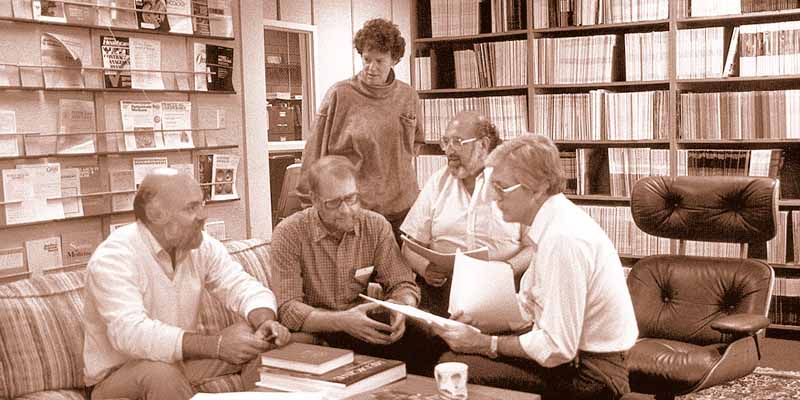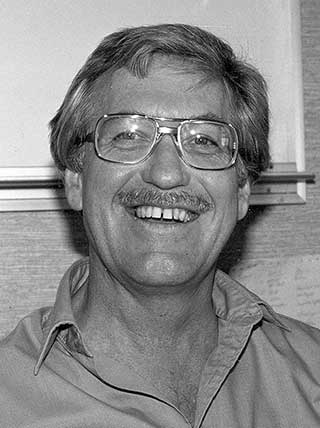CHR Mourns the Passing of Founding Researcher, Clyde Pope
Stories - May 13, 2025
 At far right, Clyde Pope is pictured discussing page proofs for Health Research in an HMO: Two Decades of Discovery (1988). Also pictured, left to right: Gary Miranda, Don Freeborn, Martie Sucec (standing), and Mitch Greenlick.
At far right, Clyde Pope is pictured discussing page proofs for Health Research in an HMO: Two Decades of Discovery (1988). Also pictured, left to right: Gary Miranda, Don Freeborn, Martie Sucec (standing), and Mitch Greenlick.
By Jill Pope, Senior Scientific Editor
 Clyde Pope, PhD
Clyde Pope, PhD
With fondness, the Kaiser Permanente Center for Health Research (CHR) mourns the passing of Clyde Pope, PhD. Dr. Pope devoted nearly 30 years of his professional life to CHR and played a key role in its founding. Dr. Pope died in November 2024; a Celebration of Life was held in Milwaukie, Oregon on May 4, 2025.
Dr. Pope’s Role in CHR’s Founding
When Ernest Saward, MD, became the first medical director of Kaiser Permanente’s Northwest region in 1963, he established the Medical Care Research Unit—later, the Center for Health Research—with the help of two young researchers, Arnie Hurtado, MD, and Dr. Clyde Pope.
CHR records show that Dr. Pope consulted with Dr. Hurtado in early 1964 about the decision to create a research unit within the KPNW health care system. Dr. Hurtado noted, “I met with Clyde Pope and received good counsel on the approach and potential problems.” Together they recruited a founding director for the new program, Merwyn (“Mitch”) Greenlick, who was then a PhD student at the University of Michigan.
Dr. Pope was heavily involved in CHR from the start, not only recruiting Greenlick, but helping him develop a research agenda for the new organization beginning in 1965. He also served as a faculty member at the University of Victoria, Canada, until 1971, when he joined the center full-time as a Senior Investigator.
Together, Drs. Greenlick and Pope helped lay the foundation for CHR, which today is one of eight research centers affiliated with KP across the U.S. The vision and significance of a health-system based research program was detailed in Health Care Research in an HMO: Two Decades of Discovery (Johns Hopkins University Press, 1988), a book co-edited by Drs. Pope and Greenlick, along with Dr. Donald Freeborn:
“The [Kaiser Permanente] medical care program was a significant social experiment and had the responsibility to be seriously introspective. If the medical care system was going to fulfill its social function, it would have to develop a health services research laboratory, providing data to the health services field.”
Dr. Pope was instrumental in helping KPNW fulfill that social function. During his time at CHR, from 1971 to 1999, Dr. Pope authored or co-authored two books, one book chapter, four research monographs, and more than 75 scientific papers. In addition, he provided administrative leadership, supervision, and mentorship to many at CHR, serving as Associate Director from 1984 to 1996.
Personal Reflections
Many of Dr. Pope’s former colleagues at CHR fondly remember his leadership and scientific contributions, his mentorship, and his positive personality. Below are a few reflections from current and former CHR researchers who knew Clyde well:
“During his 40-year career as a public health scientist, Clyde played an instrumental role in the development of a new field of study – Health Services Research. Clyde’s pioneering work focused on how the structure and funding of medical care affects key outcomes including affordability, equity, safety, and, of course, patient health.
Most of this work was conducted in Kaiser Permanente Northwest, itself a pioneering prepaid group practice program. During this time Clyde published more than 75 papers in major public health journals, with ten of those papers receiving more than 100 citations by other scientists and health policy advocates.
Clyde also played a major role in building the Kaiser Permanente Center for Health Research as it became an international leader in public health research. As a senior investigator and associate director, Clyde served as a mentor for many early career researchers, including myself. His leadership and strong support of new investigators were major contributors to the success of the Center for Health Research.”
-- Victor J. Stevens, PhD, CHR Senior Investigator Emeritus
“I came to CHR when I was still a doctoral student at UC Berkeley. I was assigned to Clyde as his mentee. What a life-changing stroke of luck that was for me. Clyde was a consummate mentor, he let me find my own path while supplying support, resources and guidance. Clyde was a skilled researcher and was always generous with his knowledge and keen insights.
His encouragement helped me to build my confidence and skill as a researcher. He did have one blind spot, however: He was incredulous that I was nervous about public speaking, he simply could not understand how it could be possible. Normally empathetic and supportive, his attitude surprised me. But his example of being a relaxed and confident public speaker, along with his lack of sympathy, helped me overcome my public speaking anxieties.
We ended up working together and publishing many studies together over a 10-year period. I will be eternally grateful for having known him, he was a treasured colleague and friend to me.”
--Judith Hibbard, Dr. P.H., Professor Emerita, Faculty Fellow for Institute for Policy Research and Innovation, University of Oregon
“I remember Clyde as a warm and caring individual who offered support and encouragement to a young investigator (me) who was still trying to launch his career when he joined the Center.”
--Bill Vollmer, PhD, CHR Senior Investigator Emeritus
“Clyde was on my master’s thesis committee in 2000-2001, where he advocated for my project to use KP data on patients’ use of interpreter services. Clyde encouraged me to apply to CHR 24 years ago, which I obviously did. Clyde was an outstanding researcher, but also kind, generous, and a family man. I'm grateful for Clyde's mentorship.”
--Amanda Petrik, PhD, CHR Investigator